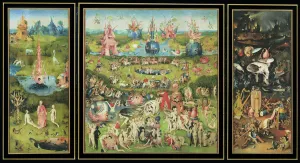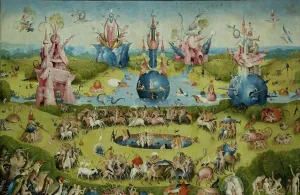Le Jardin Des Delices Collection
"Le Jardin des Delices: A Captivating Masterpiece of the 16th Century" Step into a world of enchantment and intrigue with "Le Jardin des Delices
All Professionally Made to Order for Quick Shipping
"Le Jardin des Delices: A Captivating Masterpiece of the 16th Century" Step into a world of enchantment and intrigue with "Le Jardin des Delices, " an extraordinary painting created by Hieronymus Bosch around the year 1500. This mesmerizing artwork, also known as "The Garden of Earthly Delights, " is a triptych oil on panel that continues to captivate viewers even after five centuries. Bosch's masterpiece showcases his unparalleled imagination and artistic genius. The central panel depicts a lush garden teeming with fantastical creatures, vibrant flora, and intriguing scenes that invite contemplation, and is believed to represent paradise before the fall of man, where pleasure and indulgence reign supreme. As we explore this intricate composition further, our eyes are drawn to countless details within its borders. From whimsical animals engaged in playful activities to human figures engaging in various hedonistic pursuits, each element tells its own story. The meticulous brushwork brings life to every corner of the canvas, leaving us marveling at Bosch's attention to detail. Moving towards the left panel, we encounter a depiction of Eden—a serene landscape filled with harmonious beings enjoying innocent pleasures amidst nature's bounty. Here lies an idyllic realm untouched by sin or corruption—an embodiment of purity and tranquility. On the right side unfolds a nightmarish vision—a chaotic hellscape populated by grotesque creatures tormenting sinful souls trapped in their eternal damnation. This chilling portrayal serves as a stark reminder of humanity's capacity for evil and warns against succumbing to temptation. "Le Jardin des Delices" has long fascinated art enthusiasts due to its enigmatic symbolism and open-ended interpretation possibilities. Some see it as an allegory for moral decay or warnings against earthly desires; others view it as an exploration of human psychology or even a reflection on Bosch's personal beliefs. Regardless of one's perspective, this masterpiece continues to inspire awe and spark contemplation.



